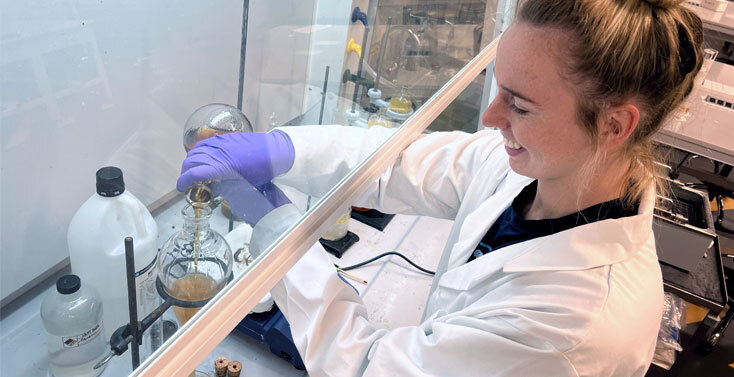
When you imagine what a biologist might do, you may envision someone in a white lab coat in a laboratory looking under a microscope. That is one possible outcome for graduates with a biology major, but there is much more to discover beyond the lab. Embarking on a degree in biology degree opens up a universe of possibilities. If you're naturally curious and captivated by the complexity of life, or simply a student wondering about the career paths that a biology degree can lead to, this article is for you.
We will explore the diverse career opportunities for biology degree graduates, from traditional roles in research and healthcare to specialized careers in environmental science and unconventional jobs. Whether you're certain you want to go on to Med school, or you're simply a student passionate about the biological sciences, this article offers valuable insights to guide your next steps.
A bachelor of science in biology paves the way to a plethora of rewarding career opportunities. The beauty of a biology degree is the sheer diversity of career options it offers. With the solid foundation a biology major requires, you can choose to go on to specialize in fields such as genetics, microbiology, ecology, botany, immunobiology or physiology, to name a few.
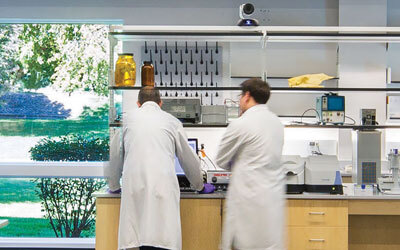
If research is your calling, private industry, government and education seek research-ready graduates that can contribute to scientific discoveries and product development in the lab. From exploring the human genome to conducting research on novel drug therapies, research roles offer the opportunity to make a significant impact in the fields of medical research, biotech, agriscience, food science and more.
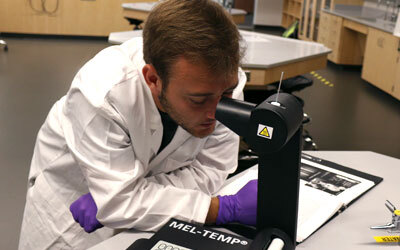
If you're drawn to healthcare or plan to pursue a medical or health program, a biology degree offers a critical foundation. With plenty of laboratory experience and the hands-on exploration of life under the microscope that it offers, you can prepare for careers as a physician, dentist, nurse, pharmacist, or optometrist, among others. The knowledge and skills acquired through your biology major requirements are mandatory in most healthcare fields.
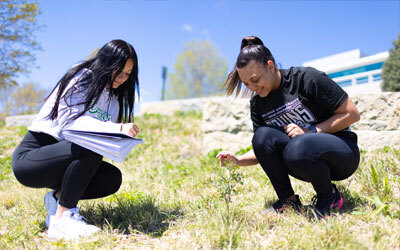
For those with a passion for the environment and conservation, biology offers exciting opportunities to make a difference. Careers in environmental conservation allow you to contribute to the preservation of ecosystems and endangered species and the discovery and promotion of sustainable practices. Moreover, biology educators at the secondary level play a crucial role in inspiring future scientists and conservationists.
Whether you see yourself in a research lab, a healthcare facility, a classroom or immersed in the natural world, your biology education prepares you with the knowledge and skills to make a meaningful impact in your chosen field.
[My professor] provided a lot of support and guidance in and outside the classroom as I worked on my senior thesis, which involved studying aquatic macro invertebrates in a Nebraska creek. I always wanted to make a difference in regards to wildlife conservation and I truly feel like I can make that difference every day with my job. That means more to me than I can put into words.
Read more about how Marissa found her dream career.
A biology degree paves the way to a variety of specialized career fields where you can apply your knowledge and skills. Let's look at some of these options:
A biology degree can lead to a dynamic career in biotechnology and biosystems. In biotechnology, you can work on developing new diagnostic techniques and medical devices, improving agricultural practices, or conducting research in genetic engineering for agriscience.
If helping to solve crimes ignites passion in you, forensic science offers opportunities in crime scene investigation, DNA analysis, crime lab processes and forensic toxicology.
Another path for biology graduates is in the government, policy, and business sectors. Leveraging your biology expertise, you can help shape public health policies, environmental regulations and compliance, or work in government agencies focused on wildlife conservation or watershed management. Additionally, many businesses need professionals with a biology background for roles in environmental consulting, pharmaceutical sales, and product research and development in food science.
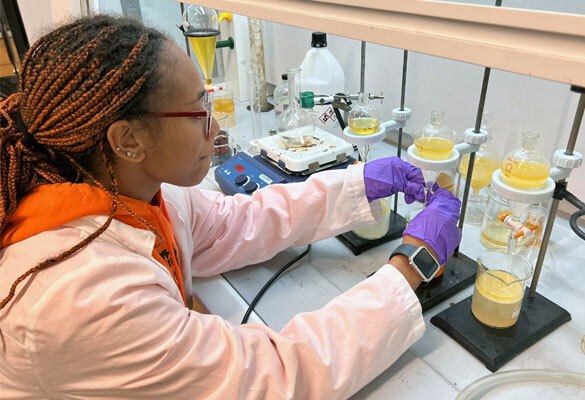
These are just a few examples of the specialized career paths available to biology graduates. The field of biology is vast and offers countless opportunities to make a meaningful impact in many industries.
While many biology graduates opt for the traditional career paths we have mentioned already, there are also alternative career paths that you could pursue with a biology degree.
Another area where biology graduates can find unique roles is in education. Paired with an education degree, biology majors can become science educators, inspiring future scientists at the middle school, high school or the post-high school level with an advanced degree.
Bioinformaticians apply data science skills to solving problems in medicine and the life sciences. As a biology graduate, you can explore opportunities in bioinformatics, where you can apply your combined understanding of life science and computer science to collect, analyze and interpret biological and biochemical information—especially as applied to molecular genetics and genomics. Bioinformatics data analysis is a quickly advancing field that is becoming more and more critical in public health and numerous industries.
If you have strong writing skills and can communicate scientific concepts, a biology degree can lead to a career in science publishing and communication. You could work as a public relations representative in a biotech industry, or as a science writer, crafting engaging content to explain complex biological concepts to a wider audience. Alternatively, you can venture into science journalism, reporting on the latest discoveries and advancements in the field of science.
One way to advance your biology career is to pursue pre-professional or graduate degrees in the field. Master's and doctorate degrees offer specialized knowledge and skills that open doors to higher-level positions and increased earning potential.
Pre-professional degrees, such as a Bachelor of Science in Biology, set the groundwork for further education and can lead to careers in research, healthcare, or teaching. Professional schools, such as med school, pharmacy school, physical therapy and osteopathic medicine schools, or even veterinary school often require the broad foundation that a biology major provides. To learn more about pre-med preparation, visit the Bellevue University Pre-Medical Certificate of Completion and the course listing under the BS in Biology.
Advanced degrees, such as a master's or Ph.D. in Biology, can lead to advanced research positions, leadership roles, or academia. If you choose to continue your education beyond the bachelor's degree level, selecting the right specialization at the graduate level is a critical step in advancing your career. Biology is a field with numerous sub-disciplines, including molecular biology, biochemistry, microbiology, genetics, immunobiology, ecology, climatology, biosystems engineering, hydrology and more. By choosing a specialization that aligns with your career goals and interests, you can focus your graduate studies and develop specialized expertise that sets you apart in the job market.
Career prospects for biology graduates are diverse and promising. With a biology degree, you can work in various industries as we've discussed, such as pharmaceuticals, biotechnology, environmental science, healthcare, or veterinary science. You might pursue roles as a clinical laboratory technologist, environmental engineer, forensic biologist, or science educator, among others.
Salaries in the biology field vary based on factors such as education level, experience, specialization, and location. Regardless, the best places to go for job outlooks and wage statistics in the United States are the U.S. Bureau of Labor Statistics and O*NET Online, the occupational outlook data from the U.S. Department of Labor.
If you're passionate about the life sciences and aspire to make a difference through scientific processes and discovery, a biology degree can provide the foundation and opportunities to achieve your goals.
At Bellevue University, we offer an experiential biology program that equips students with the knowledge, foundation and skills needed to excel in the field. Discover our state-of-the-art laboratories and program offerings and start your journey towards a fulfilling science career today.
What can you achieve with a biology degree? Read about what some of our natural science students and faculty are doing in the field in our Natural Science Center's blog, "Science on Display," whose name refers to the visual accessibility of our laboratories as well as our desire to introduce students to the process of science. Science on Display is an invitation to those with a similar fascination with uncovering the mysteries of the natural world.
What makes us unique compared to most other [larger] institutions, is that we have small class sizes and faculty-taught labs, in addition to the excellent science lab facilities and resources.
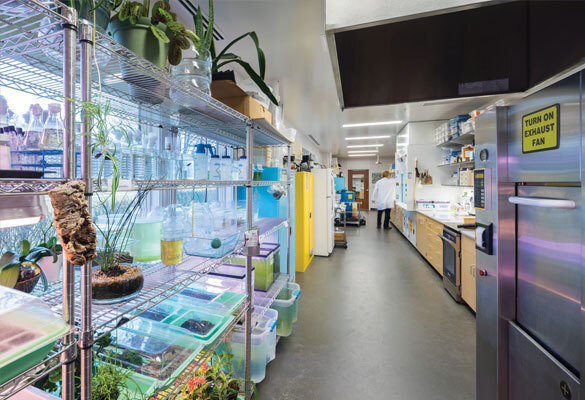
Bellevue University offers students the valuable opportunity to complete student-led research and to publish peer-reviewed research while an undergraduate. We also have resources to help you find internships and work experience in the field of biology. Both research and internships can offer valuable hands-on experience and networking opportunities, helping you develop the practical skills and connections necessary for a successful career. Our Career Services team can assist you in finding internships and work experience opportunities that align with your interests and career goals.
It seemed like an easy choice to go back to Bellevue, as my first experience was really great, and the labs had undergone a huge renovation since I had been there before and were very impressive. I chose biology because I initially wanted to go into the healthcare field, but after spending a lot of time in the labs, I decided I wanted to continue to do lab science. I would not have gotten the job I did without it. I feel very capable and able to jump into my new career because of the time I spent in and out of class at Bellevue.
Read more about Danielle's experience that prepared her for the real world.